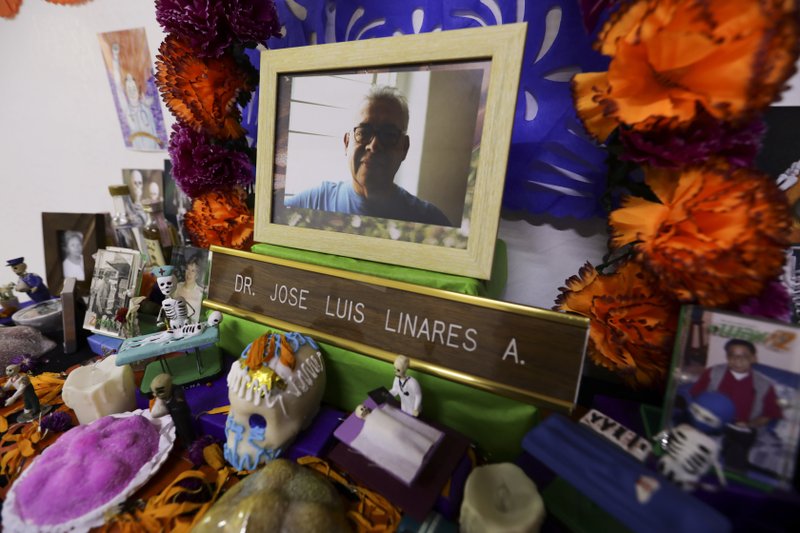
MEXICO CITY (AP) — The diminutive figure of a skeleton in a face mask and medical cap has a hand on a bedridden patient. At its side is the sort of skull made of sugar common on Day of the Dead altars. And behind is the photo of a white-haired 64-year-old man in glasses smiling at the camera: the late Dr. Jose Luis Linares.
He is one of more than 1,700 Mexican health workers officially known to have died of COVID-19 who are being honored with three days of national mourning on these Days of the Dead.
Linares attended to patients at a private clinic in a poor neighborhood in the southern part of the city, usually charging about 30 pesos (roughly $1.50) a consultation. Because he didn’t work at an official COVID-19 center, his family doesn’t qualify for the assistance the government gives to medical personnel stricken by the disease, his widow said
“I told him, ‘Luis, don’t go to work.’ But he told me, ‘Then who is going to see those poor people,’” said his widow, Dr. María del Rosario Martínez. She said he had taken precautions against the disease because of lungs damaged by an earlier illness.
In addition to the usual marigolds and paper cutouts for Day of the Dead altars, hers this year includes little skeleton figures shown doing consultations or surgeries in honor of colleagues who have died.
It’s echoed in many parts of a country that as of September, according to Amnesty International, had lost more medical professionals to the coronavirus than any other nation.
They include people like nurse Jose Valencia, and Dr. Samuel Silva Montenegro of Mexico City, whose images rest atop altars in the homes of loved ones in Mexico City,
Martínez’s altar is in a living room beside a room in their apartment where she and her husband gave consultations. Martínez, who also fell ill but recovered, now sees patients only online or by phone.
Linares died May 25 after being hospitalized at a peak of infections in Mexico City. Martínez lost consciousness at the news, but when she came to, she found her only son and her sister were hugging her. “Don’t touch me, don’t touch me!” she yelled, fearing they too would be infected.
At the peak of her own illness, she trekked from saturated hospital to overflowing clinic, looking for help.
Martínez, 59, said she now feels better, and at peace, though not resigned to the loss of her husband of 36 years, who she first met as a girl selling gum outside a movie theater to help support her eight brothers and sisters.
“I feel strange,” she said. “But I owe it to the patients and they are going to help me get through this.” She said, though, that she expects to work fewer hours.
“I’m afraid because we don’t know how much immunity you’re doing to have, how long it will work,” she said. “The illness is very hard, very cruel. … All over the world, we are going to have a very sad story to tell.”
Mexico has reported more than 924,000 confirmed coronavirus infections and nearly 140.000 deaths listed as confirmed or probable, though experts say the actual numbers are likely significantly higher.
Still Martinez has found comfort in Mexico’s Day of the Dead practices.
“According to the traditions and beliefs, he is going to come here, accompany us, and he is going to be happy that I am thinking of him in this moment.”
___
Associated Press writer Maria Verza contributed to this report.
Image: A portrait of Dr. Jose Luis Linares who died from symptoms related to COVID-19, placed on a Day of the Dead altar made by his wife Rosario Martinez at their home in Mexico City, Sunday, Nov. 1, 2020. He is one of more than 1,700 Mexican health workers officially known to have died of COVID-19 who are behind honored with three days of national mourning on these Days of the Dead. (AP Photo/Eduardo Verdugo)




